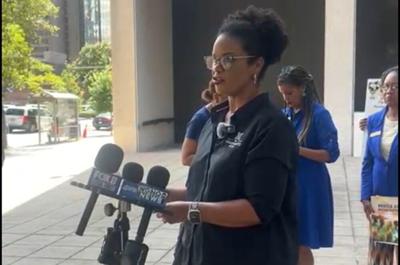
Jo Banner, a co-founder of The Descendants Project, announces the filing of the federal lawsuit on July 9.
The company that’s planning to build a $9.4 billion plastics plant in St. James Parish is violating the constitutional rights of community groups to visit and care for a slave cemetery site on plant property, a lawsuit filed by the groups alleges.
Inclusive Louisiana and The Descendants Project filed the federal lawsuit July 9 in the Eastern District of Louisiana. In their complaint against defendant FG LA LLC, a unit of Taiwan-based Formosa Plastics Group, the groups argue the company has denied them access to the cemetery site on several occasions in violation of the 13th Amendment, which abolished slavery and involuntary servitude, and Louisiana’s cemetery dedication laws.
The existence of the Buena Vista Plantation Cemetery in an area where enslaved people once engaged in sugarcane farming was confirmed by FG LA’s archeologists in 2018, according to the lawsuit. The site is now bordered by a chain-link fence with barbed wire.
“Local descendant community members were forced to go to court in June 2020 to obtain a court order allowing them to visit the site,” the complaint says. “Since being ordered by a state court to allow access to the cemetery, Formosa has done so begrudgingly, making plaintiffs’ and the descendant community’s access to the site increasingly difficult.”
The plaintiffs accuse the company of failing to maintain an access road to the site, interrupting their services to honor the dead, surveilling them and not allowing them to place headstones on the property.
The company’s director of community and government relations, Janile Parks, said FG LA was aware of the lawsuit, although it has not as yet been formally served. The company remains committed to preserving St. James Parish’s history and cultural resources, Parks said in an email to the Louisiana Record.
“FG has been and will always be respectful of the remains and unmarked burial site within property the company owns in St. James Parish,” she said. “With the oversight of and coordination by the appropriate governmental agencies, FG has followed all procedures in researching and preserving the protected area. FG has been fully transparent and cooperative in giving residents access to the burial site.”
The lawsuit argues that the 13th Amendment mandates that the community groups, whose members include descendants of 19th-century plantation workers in the region, have the right to visit and maintain the cemetery site and “honor and dignify” the dead.
The complaint paints a horrific picture of life on the region’s sugarcane plantations under the slavery system, with the average age of death of an enslaved person in St. James Parish from 1850 to 1860 estimated at 21.4 years.
As the owner of the land containing the graves of the plantation workers, FG LA has inherited a “lingering vestige” of slavery, according to the lawsuit.
The complaint argues that the company has violated the state’s cemetery law by limiting community members’ access to the site, placing onerous conditions on those who seek to visit the cemetery, interfering with descendants’ efforts to maintain the site and worship there, and failing to maintain a safe path to and from the cemetery.
The plaintiffs have asked the court to prevent the removal of human remains from the site, to end the company’s control of the cemetery, declare that community members’ rights have been violated and to allow the placement of headstones at the site.




